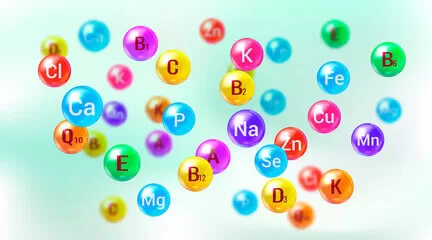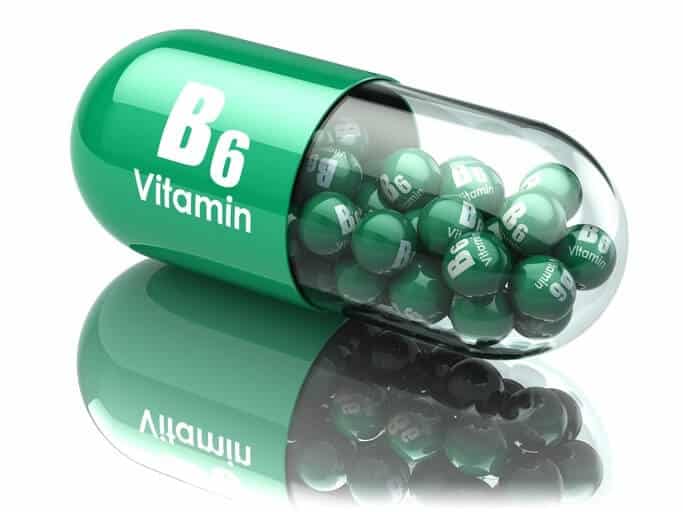Content of the Article
- What is Vitamin B3?
- What Does Vitamin B3 Do?
- What Are the Benefits of Vitamin B3?
- Vitamin B3 Benefits to Skin
- What's In Vitamin B3?
- Vitamin B3 Supplement
- What You Need to Know About the Harms of Vitamin B3
- What is Vitamin B3 Deficiency?
- Vitamin B3 Deficiency Symptoms
- How to Understand Vitamin B3 Deficiency?
- Diseases Seen in Vitamin B3 Deficiency
- Daily Vitamin B3 Need
Vitamin B3 is an important nutrient that our body needs to function healthily. At the same time niacin This vitamin, also known as vitamin A, supports many vital functions from energy production to nervous system functions. However, sometimes vitamin B3 deficiency may occur due to an unbalanced diet or other health problems. In this article, we will discuss in detail what vitamin B3 contains and how its deficiency can be compensated.
What is Vitamin B3?
Vitamin B3, or niacin as it is also known, is a very important vitamin for our body. B-complex vitamins This substance is taken with food and is not stored in our body. It needs to be taken regularly every day. Vitamin B3 exists in three forms: nicotinic acid, niacinamide and inositol hexaniacinate.
Vitamin B3 has many important functions in our body. One of its most important duties is to contribute to energy production. It regulates our metabolism by supporting the conversion of carbohydrates, fats and proteins into energy.
Vitamin B3 is found naturally in many different foods. Foods such as chicken, turkey, fish, milk, cheese, eggs, mushrooms and whole grains are good sources of vitamin B3. Some herbal sources also contain this vitamin; Green leafy vegetables, beans, chickpeas, lentils and nuts can be given as examples.

What Does Vitamin B3 Do?
Vitamin B3 plays many important roles in our body. It has various functions in the body in the following ways:
- Energy production: Vitamin B3 enables the conversion of carbohydrates, fats and proteins into energy. Therefore, it supports the body's energy production processes.
- Nervous system health: Vitamin B3 is necessary for the proper functioning and communication of nerves.
- Muscle health: Vitamin B3 is vital for muscle health and helps maintain muscle function.
- DNA repair: Vitamin B3 plays a role in DNA repair and replication. Thus, it helps DNA replicate and function properly.
- Cholesterol regulation: Vitamin B3 is effective in regulating cholesterol. It reduces bad cholesterol (LDL) and increases good cholesterol (HDL).
- Skin health: Vitamin B3 is important for healthy skin. Thanks to its antioxidant properties, it protects skin cells and repairs skin damage.
- Digestive system health: Vitamin B3 supports digestive system health and aids in the production of digestive enzymes.

What Are the Benefits of Vitamin B3?
Vitamin B3 benefits our health in many different ways. Here's what we need to know about the benefits of vitamin B3:
- It helps in energy production: Vitamin B3 helps the proper functioning of energy production processes in our body. In this way, you feel more energetic and can perform your daily activities more easily.
- Supports nervous system health: Vitamin B3 is known for its positive effects on the nervous system. It helps protect nerve cells and regulates nerve conduction.
- Helps balance cholesterol levels: Vitamin B3 protects heart health by lowering levels of “bad” cholesterol, known as LDL. It also increases “good” cholesterol, known as HDL.
- Supports skin health: Vitamin B3 plays an important role in skin health. It is known for its anti-aging effects, reducing blemishes and wrinkles on the skin.
- Regulates blood circulation: Vitamin B3 allows blood vessels to dilate and regulates blood circulation. In this way, blood flow increases and cardiovascular health is supported.
- Helps cope with stress: Vitamin B3 is effective in reducing stress and anxiety. It helps balance the nervous system and support brain functions.
- Supports protein synthesis: Vitamin B3 supports protein synthesis in the body. In this way, it is an important component for muscle development and repair processes.
- Strengthens the immune system: Vitamin B3 helps strengthen the immune system. It increases the body's capacity to fight diseases.
- It regulates the digestive system: Vitamin B3 supports the production of enzymes in the digestive system and thus improves digestion.
- Supports hair and nail health: Vitamin B3 helps the healthy growth of hair and nails. It reduces hair loss and contributes to the strengthening of nails.
Vitamin B3 Benefits to Skin
Some benefits of vitamin B3 for the skin are as follows:
- Moisturizing effect: Vitamin B3 strengthens the skin's moisture barrier and reduces water loss. The skin becomes more moist and smooth.
- Acne treatment: Vitamin B3 has the ability to reduce inflammation and prevent acne formation. It also cleans pores and prevents acne formation by regulating sebum production.
- Editing skin tone: Vitamin B3 regulates the skin's melanin production and makes the skin more even-toned. It helps reduce skin blemishes and makes the skin tone look more balanced.
- Anti-aging effect: Vitamin B3 in the skin collagen and increases elastin production. This helps tighten the skin and reduce wrinkles.
- Reducing redness: Vitamin B3 reduces skin redness and irritation. It helps the skin gain a calmer and more relaxed appearance, especially on sensitive skin.
Although vitamin B3 is beneficial for skin health, it is not enough on its own to treat skin problems. It is important to consult a specialist for the treatment of such problems.

What's In Vitamin B3?
Vitamin B3 is a vitamin that is very important for the body. So, what is vitamin B3 found in? Here are the sources of vitamin B3:
- Chicken: Chicken meat is very rich in vitamin B3. Breast meat, especially white meat, is a great option to meet your vitamin B3 needs.
- The fish: Especially salmon, tuna and oily fish such as sardines are among the foods rich in vitamin B3. They are also an important source for a healthy diet, as they are rich in omega-3 fatty acids.
- Green leafy vegetables: Spinach, chardGreen leafy vegetables such as purslane also contain vitamin B3. At the same time, these vegetables are an important part of a healthy diet because they are rich in many other vitamins and minerals.
- Milk and milk products: Dairy products such as milk, cheese and yoghurt are also sources of vitamin B3. Especially full-fat dairy products contain more vitamin B3.
- Egg: eggIn addition to many vitamins and minerals, it is also a good source of vitamin B3. Egg yolk is especially rich in vitamin B3.
- Nuts and seeds: Nuts such as hazelnuts, walnuts and almonds are among the foods containing vitamin B3. In addition, seeds such as flaxseed, sesame and pumpkin seeds are also rich in vitamin B3.

Vitamin B3 Supplement
In some cases, it may not be possible to get enough vitamin B3 from our daily diet. In such cases, vitamin B3 supplement plays an important role.
Those with vitamin B3 deficiency can use vitamin B3 supplements to eliminate the deficiency by consulting a doctor.
The most commonly used method for vitamin B3 supplementation is vitamin pills or tablets. These supplements are usually available from pharmacies and health markets. However, before you decide to use supplements, you should consult a doctor and determine the appropriate dosage. Because each individual's needs may be different and excessive vitamin B3 intake may cause side effects.
Another point you should pay attention to when taking vitamin B3 supplements is to get enough vitamin B3 from natural sources. Foods such as fish, chicken, turkey, beef, beans, nuts, corn and mushrooms are rich in vitamin B3. That's why it's important to consume a variety of foods and plan a balanced diet.
What You Need to Know About the Harms of Vitamin B3
Since vitamin B3 is not stored in the body, it is necessary to take adequate amounts daily. However, although it is important, vitamin B3 can cause some harm when taken in high doses. Here's what you need to know about the harms of vitamin B3:
- Liver problems: Intake of high doses of vitamin B3 can cause liver damage. It may cause fat accumulation in the liver and deterioration of liver functions.
- Skin reactions: Some people get skin rashes when they take high doses of vitamin B3. itchingYou may experience reactions such as a burning sensation. Such reactions are usually temporary and disappear when the dosage of vitamin B3 is reduced.
- digestive problems: When vitamin B3 is taken in high doses, it can have negative effects on the digestive system. Digestive problems such as nausea, vomiting and diarrhea may occur.
- Change in blood sugar: Vitamin B3 also plays a role in regulating insulin production and blood sugar in the body. However, when taken in high doses, it may cause changes in blood sugar levels. This is especially important for diabetic patients.
- Vascular problems: High amounts of vitamin B3 intake, when taken externally, may cause vasodilatation and weakening of the vascular walls. In advanced cases, this can lead to vascular occlusions and cardiovascular diseases.
Remember, as with every vitamin, it is important to have a balanced intake of vitamin B3. Try not to exceed the daily recommended doses and be sure to consult an expert to protect yourself from such harm.

What is Vitamin B3 Deficiency?
Many people need a variety of vitamins and minerals to keep their bodies functioning healthily. One of these is vitamin B3, that is, niacin. In some cases, there may be people who cannot take this vitamin in sufficient amounts or have absorption problems. These people experience vitamin B3 deficiency.
Vitamin B3 deficiency usually occurs due to poor eating habits. Foods such as fast food, ready-made foods, and processed products do not contain vitamin B3 or contain very small amounts of it. Additionally, alcohol addiction, liver diseases and some digestive problems can also cause vitamin B3 deficiency.
Vitamin B3 helps the body to function properly in many important processes such as energy production, nervous system functions, skin health and digestive system functions. Therefore, vitamin B3 deficiency can cause many health problems.
People with vitamin B3 deficiency often experience symptoms such as weakness, fatigue, loss of appetite and weight loss. It may also have negative effects on the nervous system. These people may experience mood disorders such as memory problems, nervous breakdown, depression and anxiety. Skin problems may also occur. Symptoms such as dry skin, rashes and itching are also associated with vitamin B3 deficiency.
It is important to follow a balanced and healthy nutrition program to prevent vitamin B3 deficiency. Foods such as meat, fish, chicken, dairy products, eggs, whole grains, and green leafy vegetables are rich sources of vitamin B3. Supplementary food products can also be used. However, it would be a better approach to consult an expert on this issue.

Vitamin B3 Deficiency Symptoms
Some symptoms that occur in case of vitamin B3 deficiency are:
- Rashes on the skin: Vitamin B3 deficiency can cause problems such as skin redness, itching, blistering, skin rashes and burning.
- Digestive problems: Vitamin B3 deficiency can cause digestive problems such as nausea, vomiting, diarrhea or constipation.
- Nervous system problems: Vitamin B3 deficiency, which has negative effects on the nervous system, can cause symptoms such as pain, numbness and tingling in the nerves. Additionally, depression, anxiety and headache may occur due to nervous system problems.
- Weakness and fatigue: Vitamin B3 deficiency disrupts the proper functioning of metabolic processes that contribute to energy production. This results in weakness, tiredness and a constant feeling of exhaustion.
- Muscle and joint pains: Vitamin B3 deficiency can lead to muscle and joint pain. In addition, problems such as muscle cramps, muscle weakness and limitation of joint movements may also occur.
- Poor digestion and loss of appetite: Vitamin B3 deficiency can affect the production of an enzyme that is important for the digestion of food and absorption of nutrients. This can cause loss of appetite, nausea, weight loss and malnutrition.
- Changes in consciousness: Vitamin B3 deficiency can cause memory problems, decreased mental concentration, lack of attention, restlessness and insomnia.
- Skin, hair and nail problems: Vitamin B3 deficiency can lead to skin problems such as dry skin and delayed healing of wounds. Additionally, problems such as hair loss, hair color change and nail breakage may also occur.
These symptoms can range from mild to severe.
How to Understand Vitamin B3 Deficiency?
Vitamin B3 deficiency is usually confirmed with a blood test. This test is used to determine vitamin B3 levels in the body. Additionally, the doctor will evaluate your nutrition and symptoms and may consider other tests to diagnose deficiency.
When vitamin B3 deficiency is diagnosed, a supplement is often prescribed. Additionally, it is recommended to eat foods containing vitamin B3. If left untreated, vitamin B3 deficiency can cause serious complications. That's why it's important to treat it when diagnosed.

Diseases Seen in Vitamin B3 Deficiency
Deficiency of vitamin B3, a healthy nutrient in our diet, can lead to various health problems. Diseases seen in vitamin B3 deficiency are as follows:
- Pellagra: This disease, which occurs as a result of vitamin B3 deficiency, affects the skin, nervous system, digestive system and brain. Pellagra, usually occurs due to poor nutrition, alcoholism or digestive problems. Symptoms include skin rashes, diarrhea, depression, memory loss and nerve damage.
- Dermatitis: Vitamin B3 deficiency can cause many problems on the skin. Skin lesions and rashes may occur, especially as a result of sun exposure. Additionally, skin problems such as dryness, itching and peeling may occur.
- Mental problems: Vitamin B3 deficiency can also cause negative effects on the nervous system. This deficiency can cause mental problems such as memory problems, depression, anxiety, irritability and concentration difficulties.
- Digestive problems: Vitamin B3 deficiency can also cause disorders in the digestive system. In particular, symptoms such as loss of appetite, nausea, vomiting, diarrhea and abdominal pain may be observed.
- Muscle weakness and pain: Vitamin B3 deficiency can cause muscle weakness and pain. Therefore, the person may feel weakness and experience muscle pain while performing daily activities.

Daily Vitamin B3 Need
So, how much vitamin B3 do we need to take daily?
According to the USDA, the recommended daily intake for vitamin B3 is as follows:
Children: 2--16 milligrams per day, depending on age
Men: 16 milligrams per day
Women: 14 milligrams per day
Pregnant and breastfeeding women: 17-18 milligrams per day
As a result;
Vitamin B3 is a very important vitamin for our body. Having a good diet is very important to meet the need for vitamin B3. However, in some cases, a balanced diet may not be sufficient and supplements may be necessary. At this point, you can choose the right supplement by consulting your doctor. When you notice symptoms of vitamin B3 deficiency, you should immediately take the necessary precautions.
In order to protect our health and live a good life by getting the nutrients our body needs, we should not neglect important vitamins such as vitamin B3. You may also consider reviewing your diet and taking the necessary supplements for a healthy life. Remember, your health is in your hands!










